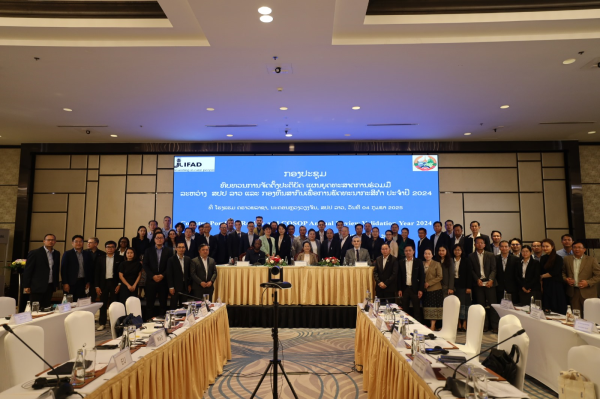KPL
The International Fund for Agricultural Development (IFAD) and the Lao PDR reaffirmed their long-term commitment to improving rural livelihoods through a high-level meeting on Tuesday. The gathering, attended by key government stakeholders and development partners, aimed to review IFAD’s current strategy in the country and set the foundation for future programs.

(KPL) The International Fund for Agricultural Development (IFAD) and the Lao PDR reaffirmed their long-term commitment to improving rural livelihoods through a high-level meeting on Tuesday. The gathering, attended by key government stakeholders and development partners, aimed to review IFAD’s current strategy in the country and set the foundation for future programs.
The Country Portfolio Review (CPR) meeting was chaired by Ambrosio Barros, IFAD Country Director; Chanthakhone Boualaphanh, Deputy Minister of Agriculture and Forestry; and Bakhodir Burkhanov, UN Resident Coordinator in the Lao PDR. They were joined by IFAD staff, senior government officials, development partners, and project stakeholders. Since 1978, IFAD has co-funded 17 projects in the Lao PDR with a total investment of approximately US$590 million.

Deputy Minister Boualaphanh expressed gratitude for IFAD’s continued financial and technical assistance, which aligns with the objectives of the 9th National Socio-Economic Development Plan (NSEDP) (2021-2025) and the UN’s Sustainable Development Goals (SDGs).
“IFAD has been an important and trusted partner in achieving our rural development goals. These discussions help us better understand how to collaborate effectively, leveraging past achievements and lessons learned,” she stated.
During the meeting, partners assessed the impact of IFAD’s Country Strategic Opportunities Programme (COSOP) for the Lao PDR, which defines IFAD's strategic objectives and expected development results. IFAD plays a crucial role in financing projects such as the Partnerships for Irrigation and Commercialization of Smallholder Agriculture (PICSA), benefiting over 350 villages by optimizing irrigation infrastructure and market linkages. Additionally, IFAD contributes to the Agriculture for Nutrition - Phase 2 (AFN II) project, which promotes sustainable, climate-resilient farming practices to enhance rural incomes and improve nutrition.
“IFAD is proud to partner with the Lao PDR in investing in rural communities for a more prosperous future. Through collaborative programs, we are empowering local farmers to build sustainable livelihoods and adapt to emerging challenges,” said Ambrosio Barros. “We look forward to continuing our work in rural finance and climate-smart agriculture to ensure a brighter future for the Lao people,” he added.
With over 60 percent of the Lao population residing in rural areas and reliant on agriculture, many farmers still depend on traditional farming methods, lacking irrigation access and proper road infrastructure. These challenges contribute to high malnutrition rates, with one-third of children under five stunted and 40 percent of women affected by anemia.
Over the past 45 years, IFAD and the Lao government have built essential social and economic infrastructure, including rural roads, small-scale irrigation systems, and farmer nutrition centers, reaching approximately 360,000 small-scale farmers facing food insecurity and malnutrition. The partnership has also facilitated access to production inputs, rural finance, technical training, and modern farming technologies, while promoting youth employment in the agricultural sector to boost incomes and economic growth.
As IFAD and Lao PDR continue their collaboration, their shared vision remains focused on fostering a resilient and sustainable agricultural sector that uplifts rural communities and secures food security for future generations.
KPL